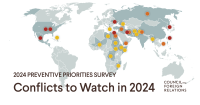Populist movements have emerged as influential forces in contemporary politics, reshaping political landscapes across the globe. In this blog, we aim to delve into the complexities of populist movements, understanding their origins, characteristics, impacts, and the implications they hold for modern governance and societies.

Understanding Populism: Origins and Characteristics
1. Defining Populism
Populism is a political ideology that pits "the people" against "the elite" and champions the interests of the common people against perceived entrenched, corrupt, or out-of-touch elites.
2. Key Characteristics
- Anti-establishment Rhetoric: Populist leaders often position themselves as outsiders challenging established political systems.
- Simplification of Complex Issues: They tend to simplify complex problems into easily digestible narratives, often appealing to emotions rather than detailed policies.
- Us vs. Them Mentality: Populism often creates a dichotomy between "the people" and "the elite" or "the other," fostering division and polarization.
Factors Fuelling Populist Movements
1. Economic Discontent
Economic hardships, inequality, and perceptions of a disconnect between political elites and the general populace contribute to the rise of populist sentiments.
2. Cultural Identity Concerns
Cultural and identity issues, including immigration, nationalism, and perceived threats to traditional values, fuel populist rhetoric.
Impacts of Populist Movements
1. Political Polarization
Populist movements often deepen existing divides within societies, fostering polarization and eroding trust in established political institutions.
2. Shifts in Policy Agendas
Populist leaders often bring about significant shifts in policy agendas, emphasizing issues like immigration, trade protectionism, or anti-corruption measures.
Challenges and Criticisms
1. Simplistic Solutions to Complex Problems
Critics argue that populist rhetoric often oversimplifies complex issues, offering simplistic solutions that may not address the root causes effectively.
2. Erosion of Democratic Norms
Concerns arise regarding the erosion of democratic norms, as populist leaders might undermine institutions, checks and balances, or minority rights.
Conclusion
Populist movements have become prominent features of contemporary politics, wielding significant influence and sparking debates. While they often resonate with discontented segments of society, their impact on governance, societal cohesion, and democratic norms remains a subject of scrutiny and debate.







